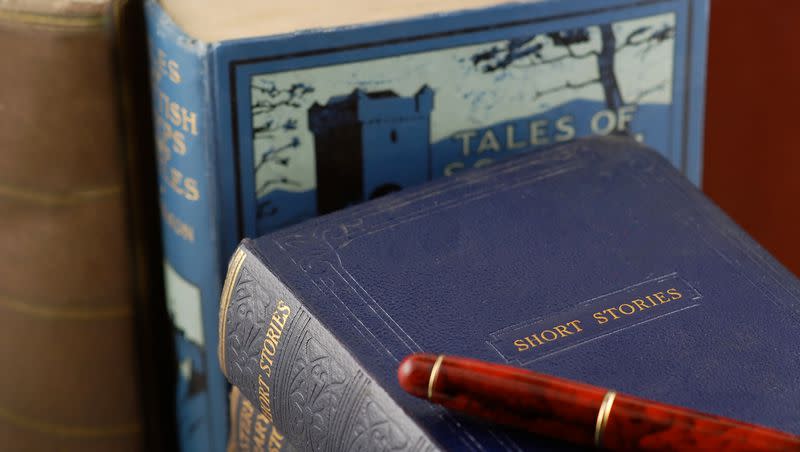Happy (almost) Thanksgiving! Here are 5 short stories to help you re-center on gratitude

- Oops!Something went wrong.Please try again later.
The holiday season is picking up. In the frenzy of Thanksgiving and Christmas, many feel that they really just don’t have time to read. Not to worry, our literary ancestors have gifted us with a solution to this dilemma: the short story.
Here are five short stories that will help you re-focus on what really matters most. Each of them are available to the public domain, and PDFs are attached.
1. ‘The Necklace’
Author: Guy de Maupassant.
Publication: 1884.
“The Necklace” tells the story of Madame Mathilde Loisel, who longs for wealth and status. She and her husband receive an invitation to a fancy evening party. To fit in, she borrows a diamond necklace from a wealthy friend, but loses it at some point during the night. The couple replaces it secretly, and they work their whole lives to pay off the loan. Years later, after they’ve lived basically at the poverty line, Mathilde learns the necklace was a fake, making their sacrifices meaningless.
Notable quotation: “She danced madly, ecstatically, drunk with pleasure, with no thought for anything, in the triumph of her beauty, in the pride of her success, in a cloud of happiness made up of this universal homage and admiration, of the desires she had aroused, of the completeness of a victory so dear to her feminine heart.”
2. ‘I Stand Here Ironing’
Author: Tillie Olsen.
Publication: 1961.
“I Stand Here Ironing” is a short story written in a stream-of-consciousness style. A mother reflects on her strained relationship with her daughter, Emily. She reflects on her childhood and how she wasn’t able to give her the love she wanted to. She worries this neglect may have led to Emily’s timidness and lack of self-esteem. In the end, she expresses hope that Emily will recognize her own worth independently of her difficult upbringing.
Notable quotation: “She starts up the stairs to bed. ‘Don’t get me up with the rest in the morning.’ ‘But I thought you were having midterms.’ ‘Oh, those,’ she comes back in, kisses me, and says quite lightly, ‘in a couple of years when we’ll all be atom — dead they won’t matter a bit.’”
3. ‘A Small, Good Thing’
Author: Raymond Carver.
Publication: 1983.
“A Small, Good Thing” is about a mother and father’s grieving process after their son, Scotty, is hit by a car on his birthday. Before the accident, his mom orders a birthday cake from a local bakery. Since they’ve forgotten about the cake, the baker calls their home repeatedly. The parents show up at the bakery angry, and the baker sits them down and listens to them.
Notable quotation: ‘‘Smell this,’ the baker said, breaking open a dark loaf. ‘It’s a heavy bread, but rich.’ They smelled it, then he had them taste it. It had the taste of molasses and coarse grains. They listened to him. They ate what they could. They swallowed the dark bread. It was like daylight under the fluorescent trays of light. They talked on into the early morning, the high, pale cast of light in the windows, and they did not think of leaving.”
4. ‘Flowers for Algernon’
Author: Daniel Keyes.
Publication: 1959.
“Flowers for Algernon” is a sci-fi short story that follows Charlie Gordon, a man with intellectual disabilities, who undergoes a surgical procedure to increase his intelligence. The experiment, first completed successfully on a mouse named Algernon, seems to be a huge success for Charlie, improving his life initially. However, when the mouse’s intelligence begins to regress and he dies, Charlie realizes the same will happen to him. His intelligence reverts to what it once was, but he keeps a keen awareness of what he’s lost.
Notable quotation: “Even a feeble-minded man wants to be like other men. A child may not know how to feed itself, or what to eat, yet it knows of hunger.”
5. ‘A Temporary Matter’
Author: Jhumpa Lahiri.
Publication: 1998.
“A Temporary Matter” tells the story of a couple, Shukumar and Shoba, navigating their grief after their baby is stillborn. The story begins with their electric company notifying them of a five-day power outage caused by a recent snowstorm. This prompts the couple to start a ritual of sharing secrets in the dark. Each day, they become more open and vulnerable, seemingly reconnecting.
Notable quotation: “As he watched the couple the room went dark, and he spun around. Shoba had turned the lights off. She came back to the table and sat down, and after a moment Shukumar joined her. They wept together, for the things they now knew.”

